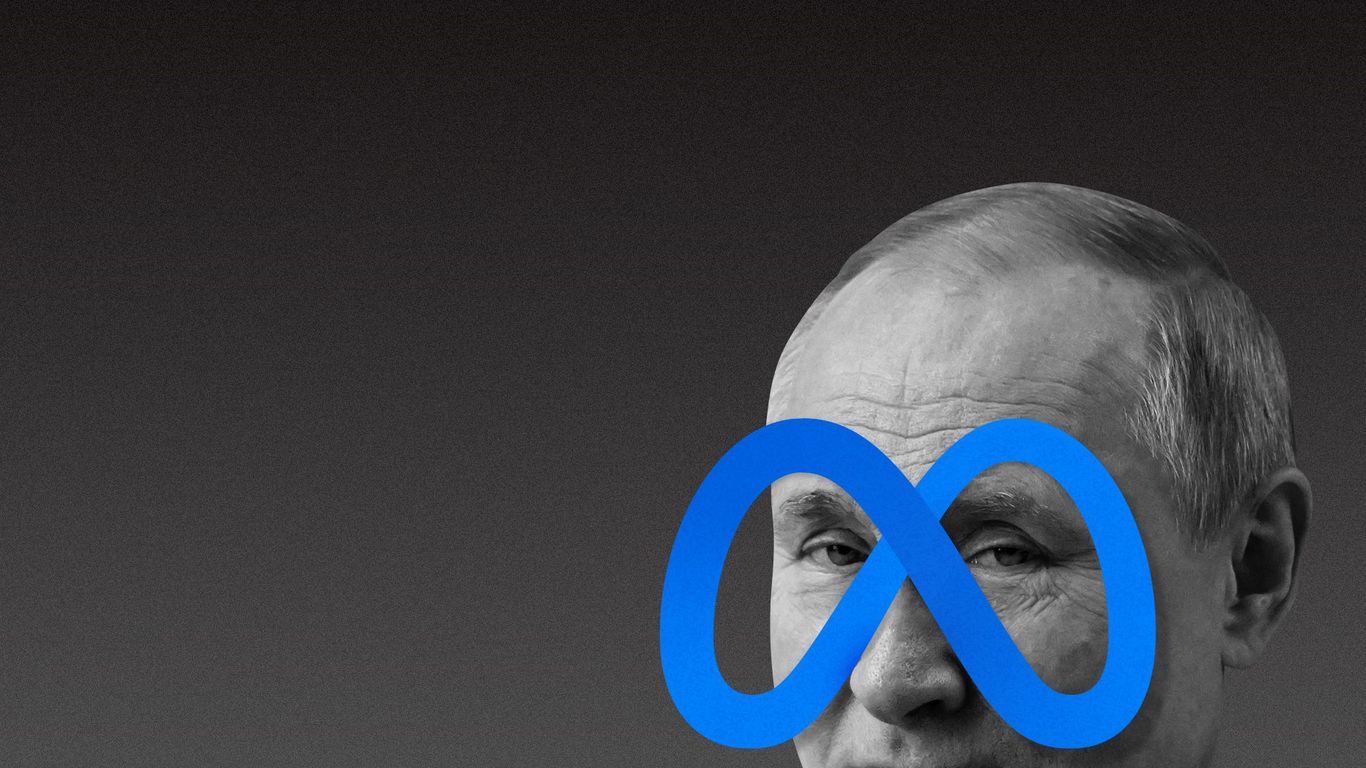China’s state media buys Meta ads pushing Russia’s line on war
Written by ABC AUDIO on April 3, 2022


Ads from Chinese state broadcaster CGTN are running on Meta-owned Facebook, targeting global users with pro-Russian talking points about Russia’s invasion of Ukraine.
Driving the news: Meta said last week it would ban ads from Russian state media and stop recommending content from such outlets. But that hasn’t stopped countries close to Moscow, like China, from using their state channels to buy ads pushing a pro-Russian line.
- In 2020, Meta said it would begin blocking state-controlled media outlets from buying advertising in the U.S. But those outlets can still buy ads targeting users abroad.
The big picture: Beijing views Russia as a close partner, and has stayed by Putin’s side as he invaded Ukraine, even going so far as to blame the invasion on the U.S. and NATO.
Details: China Global TV Network, a China state-controlled outlet with nearly 118 million followers on Facebook and 2.4 million on Instagram, placed at least 21 advertisements on Facebook this month, most featuring newscasts about the war or media briefings from Chinese officials.
Meta’s advertising library, which is intended to provide a transparent record of all ads running on Meta’s services, does not specify how much CGTN spent on the ads or which countries it targeted, and the company declined to provide that information.
- Per a search, some of the ads are targeted at users in Hong Kong, Azerbaijan, Kazakhstan, Uzbekistan, Turkmenistan and Tajikistan.
- Many of the ads, which are mostly clips of CGTN newscasts, sprinkle in pro-Russia, anti-NATO talking points and downplay Russia’s actions in launching an unprovoked invasion of its neighbor.
Context: CGTN is an international news channel owned by China Central Television (CCTV), controlled by the Chinese Communist Party, and claims to reach 1.2 billion people across the world, including 30 million households in the U.S. In 2021, the UK revoked its broadcasters’ license, and in 2019, CGTN America registered as a foreign agent in the U.S.
State of play: China’s domestic media have supported Russia’s propaganda about the war and systematically amplified pro-Putin talking points, Axios’ Bethany Allen-Ebrahimian previously reported.
- Twitter barred all state-backed outlets from buying advertising in 2019, and recently added labels to Tweets for state media. Google-owned YouTube, which just cut off Russian state media from monetization, promised to label state-sponsored videos in 2019, but its track record is spotty, ProPublica previously reported. TikTok has started piloting labels on Russian state-controlled media accounts and bans political ads globally.
- Meta’s platforms are blocked in China, but China’s state-sponsored media is a big user of Facebook, along with Twitter. The Wall Street Journal reported in 2021 on Beijing-sponsored Facebook ads and content that portrayed Muslim ethnic minorities in Xinjiang — where the U.S. and activists have documented a slew of human rights abuses — as happy and thriving.
What they’re saying: While Meta is protecting U.S. users from state-sponsored media disinformation, the rest of the world deserves similar protections from known bad actors like China’s state media, Laura Edelson, an online disinformation expert who is a Ph.D. candidate in computer science at New York University, told Axios.
- “Facebook is a global platform, and this conflict is going to have repercussions for everyone living everywhere,” she said. “[The rules] matter for global stability and it’s important that they are enforced everywhere.”
The other side: Asked about the CGTN ads, a Meta spokesperson said the company had no specific comment but pointed to statements by Nick Clegg, Meta’s president of global affairs, last week.
- Clegg acknowledged to reporters that the company faces a tricky balancing act between promoting the free flow of information and stemming disinformation.
- “We’re in a completely unprecedented situation… which is why not only ourselves but many others in the tech sector are taking these pretty exceptional measures at this time,” he said.
The bottom line: Conflicts around the world continue to illustrate how hard it is for global online giants to moderate their platforms at scale and to keep entities that pay for advertising from spreading propaganda or outright falsehoods.
— to www.axios.com
The post China’s state media buys Meta ads pushing Russia’s line on war appeared first on Correct Success.




![What’s Trending: Detective Chris Anderson Talks Gun Safety With Children In The Home [WATCH] What’s Trending: Detective Chris Anderson Talks Gun Safety With Children In The Home [WATCH]](https://i.ytimg.com/vi/_Ur2d0IkAc4/maxresdefault.jpg)

